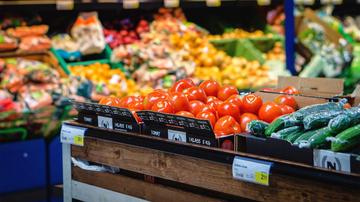
According to nation-wide studies, less than half of Slovenian population has healthy of relatively healthy eating habits. Nutrition experts note that although the Slovenian market offers more and more foodstuff that have proper nutrition content – i.e. less salt, saturated fat, refined sugars and more minerals and fibres – the population still hasn't included these in their menus.
Many consumers blame high prices of healthy organic food. "I've also noticed that products with improved nutrition content are unreasonably expensive," agrees Igor Pravst from the Institute for Nutrition Studies in an interview for MMC.
Technology is generally not to blame for high prices. "When we talk to the producers, the main reason they mention is small production series of such products. For example, for white bread that is being sold by the tonne, lower production cost can be achieved than for some special bread only a few consumers by. The producers claim that this is the main reason for high prices, not the ingredients, which are fairly the same," explains Pravst.
"If demand for such product grows in the future and if consumers are more likely to include healthier foodstuff in their diets, the production will get bigger and the prices will drop," expects Pravst, who emphasizes that processed food that comes in a box from a store is more expensive that a meal cooked from individual food products, which everyone can prepare at home. "If we make lunch ourselves from basic ingredients, it will definitely be cheaper that eating in a restaurant or buying pre-made meals," advises the nutrition expert. "The price is still indeed an obstacle. I believe that more drastic measures will have to be taken by the government in the future to make a real change," adds Pravst.
How to eat healthily when we're in a hurry?
In addition to financial cost, buyers typically mention time or rather the lack of it as one of the main reasons for leading an unhealthy diet. As life becomes more and more hectic, there is simply not enough time for the kind of cooking our grandmothers used to make.
"The British had an interesting initiative, when the famous chef Jamie Oliver, who is renowned for setting modern trends in the kitchen, has taught the people how to make a truly healthy meal in half an hour. Perhaps we would need something like that in Slovenia – to convince people that the preparation of a healthy meal doesn't take long," suggests Pravst, adding that even if lunch is consumed in a rush at work, at least breakfast and dinner can be healthy.
Increasingly longer work days and numerous obligations prevent the population from coming home before evening. Modern trends for losing weight promote the myth of eating after 6 p.m. as something that is not recommendable. "If someone has lunch that is low in calories, they can easily make a healthy dinner after 6 p.m. as a substitute for lunch. This is still better that stuffing oneself with fat and fried food at lunch in some restaurant," explains the nutritionist.
So that a healthy choice would be an easy one
"Work environments are not friendly places in terms of diet. Employees have a hard time finding a healthy meal in the short time they have at disposal as lunchtime. Not everyone has the option to bring their own food and prepare it at work," warns Urška Blaznik from the National Institute for Public Health (NIJZ).
New grocery stores specialised in healthy organic products are opening but NIJZ wishes there would not be "just a few stores with healthy food that is affordable only for a certain part of the population". Namely, their studies show that the poorly educated population tends to have lower income and worse socio-economic status, which results in lower living standard and consequently more chronic diseases.
"Using complex measures – changes in food products, work with the food processing industry, grocers and consumers themselves – we would like to create environments where the healthy choice would also be an easy choice. And 'easy' does not mean having a store right on the corner but being affordable to people at accessible and suitable prices," argues Blaznik.
"This could be achieved in various ways. One of the options is tax deductions for fruits and vegetables. But the key factor is a holistic approach to the matter – as soon as we go into one direction only, a counter-effect might appear on the other side, which is what we need to avoid," concludes our NIJZ interviewee.



































































